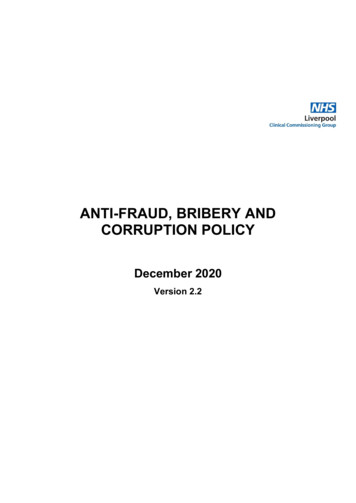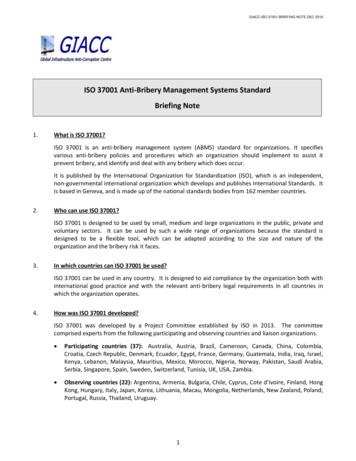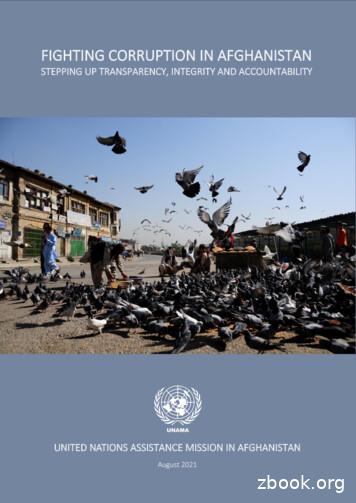Anti-bribery And Corruption - University Of St Andrews
Anti-bribery and corruptionDocument typeScope (applies to)Applicability dateReview / Expiry dateApproved dateApproverDocument ownerSchool / unitDocument statusInformation classificationEquality impact assessmentKey termsPurposePolicyAll staff29/06/202029/06/202104/08/2020Deputy DirectorHead of Financial ReportingFinancePublishedPublicNoneFinancial matters/Legal regulations/BriberyTo set out the University’s approach to dealingwith the requirements of the Bribery Act 2010 inorder to comply with the legislation.Version Purpose / ChangeNo2020.01 Annual review – updateformat for inclusion onGovernance ZoneUpdate website links fordonations,overseasand procurement policyIncluded 3.8 recordkeepingDocumentstatusApprovedAuthor, role andSchool / UnitDDoEDateIn draftDDoE03/07/2020In draftDDoE03/07/202003/07/2020The University of St Andrews is a charity registered in Scotland, No: SC013532
Contents1.Introduction and scope .32.Guiding principles .53.Policy statement and compliance with legislation .64.Processes and controls .8The University of St Andrews is a charity registered in Scotland, No: SC013532
1. Introduction and scopeThe Bribery Act 2010 (the Act) came into force on 1 July 2011.The Act, a copy of which can be found at iberyact-2010-quick-start-guide.pdf, is the most substantial change to the UK’s corruption laws since 1916.Prior to the introduction of the Act, the UK had received criticism for a poor record for prosecutingcorruption. This criticism peaked when direct intervention from the British Prime Minister in 2008led to a decision by the Serious Fraud Office not to proceed with prosecution of BAE Systemsfollowing allegations of corruption in the sale of arms to Saudi Arabia.The Organisation for Economic Cooperation and Development (OECD) is responsible for helpinggovernments tackle the economic, social and governance challenges of a globalised economy. TheUK is a member of OECD. The Act was introduced by the UK government partly in response tosustained pressure from OECD and other organisations attempting to develop common internationalstandards for global anti-corruption.The purpose of the Act is to meet these challenges by providing a new consolidated scheme of briberyoffences to prosecute bribery both in the UK and abroad. While primarily aimed at commercialorganisations the Act also covers all organisations incorporated under UK law including Charities and,therefore, includes Universities.This Policy considers the implications of the Bribery Act 2010, which came into force on 1 July 2011,for the University and what areas the University needs to consider in order to comply with thelegislation.1.1. What is Bribery?A bribe is defined in the BA 2010 as “a financial or other advantage” offered, promised or given toinduce a person to perform a relevant function of activity improperly, or to reward them for doing so(section 1).This broad-ranging description covers many types of possible advantage including gifts, hospitalityand entertainment, political or charitable donations, sponsorship and publicity. The timing of thefinancial or other advantage does not matter: it is still a bribe even if it is given or paid after the event.Individuals can be liable even if they unwittingly give or receive a bribe. Liability attaches if a bribe isoffered or promised (or agreed to); it does not have to be actually given or received. The employerdoes not need to actually receive any advantage from the offer or payment of the bribe.The University of St Andrews is a charity registered in Scotland, No: SC013532
1.2. Offences under the Bribery Act 2010The BA 2010 introduced four new criminal offences, which can be summarised as follows: Bribing another (section 1) Being bribed (section 2) Bribing a foreign public officer (section 6) Failure of a commercial organisation to prevent bribery by an “associated person” for its benefit(section 7).1.3. Who is an “associated person”?The definition of “associated person” in Section 8 of the BA 2010 is wide. It covers those who performservices for, or on behalf of, the organisation such as, for example, employees, agents andsubsidiaries (section 8(3)). The capacity in which the person performs the services does not matter.There is a presumption that employees will be associated persons of the employer. However, othersworking for the University, such as consultants, agency workers and volunteers will also be associatedpersons for the purpose of the BA 2010. Associated persons are referred to as workers in this policy.The University is therefore potentially responsible for the actions of a wide range of individuals, someof whom it may have minimal control over.1.4. PenaltiesThe consequences of a breach of the BA 2010 are severe. Individuals face up to ten yearsimprisonment, and commercial organisations can be fined an unlimited amount and prevented fromtendering for public contracts.1.5. The “adequate procedures” defenceUnder section 7(2) of the BA 2010, an organisation has a defence if it can show that it had in place“adequate procedures” designed to prevent bribery. There is, however, no definition or specificexplanation as to what constitutes adequate procedures.1.6. Governing BodyThe Governing Body, the University Court of St Andrews, is fully committed to compliance with theBribery Act 2010.1.7. Scope and PurposeThis policy applies to all University employees and associated persons and workers includingMembers of Court, Contractor, temporary or agency staff or unpaid members of staff and voluntaryworkers. It also applies to staff in subsidiary companies. The policy applies to all activities of theUniversity, whether related to its research, teaching, commercial or other activities, and exists forthe protection of members of staff, workers and the University.The University expects any person or organisation performing services for it or on its behalf, toadhere to this policy or otherwise have equivalent procedures in place to prevent corruption. Thesethird parties include agents and others who represent the University suppliers, consultants andprivate sector partners as well as who perform services for the University or on its behalf, bothdomestically and internationally. As the University operates internationally, employees arereminded to be extra vigilant when conducting business overseas as there may be a greater risk ofexposure to unethical activity.The policy sets out the scope of the University’s approach to dealing with the relevant legislation, asfollows:The University of St Andrews is a charity registered in Scotland, No: SC013532
Nature of OffencePaying bribesReceiving bribesBribery of a foreign public officialFailure of a commercialorganisation to prevent briberyScopeMembers of staff of the Universityand those representing theUniversity, including workersMembers of staff of the Universityand those representing theUniversity, including workersMembers of staff of the Universityand those representing theUniversity, including workersThe University and its subsidiarycompaniesThe policy also covers issues related to the following other policies and Codes of the University,where guidance is given on each specific policy and can be found on the HR webpage under Policiesand Procedures or the full list of financial operating procedures: linaryprocedures/ http://www.st-andrews.ac.uk/staff/policy/hr/gifts/ eblowingpolicy/ operatingprocedures/1.8. Breach of PolicyWhere an allegation is made to the effect that a member of staff has breached this policy, the matterwill be dealt with under the University’s Disciplinary Policy. Where, after an investigation andsubsequent disciplinary hearing, allegations are upheld, the employee may be subject to formaldisciplinary sanctions up to and including dismissal.Where third parties performing services or supplying goods for, or on behalf of the University, are inbreach of this policy, action may be taken by the University up to and including terminating therelevant contractual relationship.2. Guiding principlesOrganisations are required to set out adequate procedures designed to prevent bribery and thefollowing six principles have been identified by the UK Government: Top level commitment Risk assessment Proportionate procedures Due diligence Communication (including training) Monitoring and reviewThe University of St Andrews is a charity registered in Scotland, No: SC013532
3. Policy statement and compliance with legislation3.1Policy StatementIn accordance with the highest standards of professional practice and good governance, theUniversity will not tolerate bribery or corruption of any kind.All members of staff, workers and agents of the University must adhere strictly to the UK legislationin relation to bribery and corruption and follow the procedures designed by the University to preventbribery.Staff must not offer, promise or pay bribes and they must not request or receive bribes. TheUniversity will also expect the highest standards of compliance in this area from other parties thatprovide services to the University or on its behalf.3.2The Code of Public Interest Disclosure (‘whistleblowing’)The University Court of St Andrews is committed to ensuring that the University conducts its affairsin a reasonable, ethical and transparent way and conforms to those standards. This also includesdetection, prevention and reporting instances of possible bribery or corruption.Consequently, the Court will ensure that any former or current University employee or student whohas information about possible malpractices within the University during her/his membership of theUniversity is able to bring that concern immediately to its attention. The designated contact toreceive such concerns is the Convener of the Audit and Risk Committee of the University Court.Letters may be sent to the Convener (marked ‘For Forwarding without Opening’ and ‘Strictly Privateand Confidential’ to the Court Office, College Gate, North Street, St Andrews, Fife, KY16 9AJ or byemail via a special account with the address whistleblowing@st-andrews.ac.uk.When a disclosure is made, the Convener of the Audit and Risk Committee, having obtained legaladvice as necessary, shall normally consult with the Senior Governor. The latter will ensure that thematter is fully investigated and determined as (s)he thinks fit by either University procedure, ifappropriate, or referred to the Police or other relevant Authority. The Senior Governor will reportthe outcome of the investigation (whether internally or external investigated) to both the originalcomplainant and to the University Court.A full copy of The Code of Public Interest Disclosure (‘whistleblowing’) can be found stleblowingpolicy/Alternatively, staff may seek further information from the Finance Director. It is the choice of theindividual as to whom they wish to report instances of possible bribery or corruption.3.3Risk AuditAn external Risk Audit was carried out by Ernst & Young in conjunction with the Quaestor and FinanceDirector of the University. The areas below were initially highlighted as potential concerns within theinstitution: Overseas Agents Trading Subsidiaries Donations Large Scale Procurement Gifts and HospitalityThe University of St Andrews is a charity registered in Scotland, No: SC013532
Key staff who operate in these areas of the University received a briefing by the external auditorsErnst & Young on the fundamental details of the new legislation.3.4ResponsibilitiesLine managers from the Principal’s Office down, are responsible for ensuring that: All employees with whom they work are aware of this Policy and attend training as necessaryon how it affects their work;They promote all other anti-corruption compliance measures within the parts of the Universityin which they work and that they lead by example.They inform their Head of School / Director of Unit immediately when they are notified of anycorruption concerns.All employees are expected to: Adhere to the University’s anti-corruption procedures, and other similar policies, as far as theyare applicable to their roles within the University;Raise corruption concerns immediately with their line managers or their Head of School/Unit;Follow University guidance and best practice when involved in activities relating to theprocurement of goods, services or works, or using overseas or other agents and third parties3.5Due DiligenceThe University will ensure that individuals, incorporated and/or unincorporated bodies who ‘performservices for or on behalf of the University’ ie members of staff, workers, agents and subsidiaries arefully aware of the implications of the Bribery Act 2010.3.6Communication and TrainingMembers of the Audit and Risk Committee received training from Ernst & Young on the implicationsof the Bribery Act 2010 in June 2011. Those members of staff to which the Bribery Act 2010 directlyrelates, will continue to receive specific guidance and training on an ongoing basis.3.7Monitoring and ReviewEffective monitoring and review is critical to the long-term sustainability of an anti-bribery initiativeand the University is committed to ensuring that the effectiveness of its procedures and processesare regularly updated in order to comply with updates/changes to the Act. One area in whichcontinual assessment will take place is with regard to new markets into which the University maydevelop/expand in the future.3.8Record-keepingThe University maintains financial records and has appropriate internal controls in place throughother policies and procedures to ensure all payments to third parties (such as payments to anyonewho provides services for or on its behalf) are properly documented and authorised.The University of St Andrews is a charity registered in Scotland, No: SC013532
4. Processes and controlsSpecific policies have been created covering the following areas: Overseas Agents Trading Subsidiaries Donations Large Scale Procurement Gifts and HospitalityThese have been implemented in order to reduce the risk or opportunity for bribery covering theseareas (as noted in 1.7) and can be found at:Overseas t/Large Scale ey/procurement/policies/Gifts and .ac.uk/staff/policy/hr/gifts/Trading Subsidiaries:Contact Keith Millican, Group Finance Director, St Andrews Applied ResearchLtdThe Policy Appendices have been collated to add further clarity to the type of examples where theAct could be relevant, for individuals within the University, or acting on its behalf.The University of St Andrews is a charity registered in Scotland, No: SC013532
Bribery of a foreign public official Members of staff of the University and those representing the University, including workers Failure of a commercial organisation to prevent bribery The University and its subsidiary companies The policy also covers issues related to the following other policies and Codes of the University, where guidance is given on each specific policy and can be found on .
bribery and corruption and implications of an investigation. It is not intended to detail a comprehensive approach to preventing and detecting fraud, bribery and corruption. Issue Date: Page 6 of 21 Document Name: Anti-Fraud, Bribery and Corruption Policy Version No: 2 Definitions . The definitions applicable to this policy are as follows: 2.1 NHS Counter Fraud Authority . The NHS CFA is a new .
Anti oxidation, Anti aging Anti oxidation, Anti aging Anti oxidation, Anti aging Skin regeneration, Nutrition, Anti wrinkle Anti oxidation, Anti aging Anti oxidation Whitening Whitening Effects Skin Whitening, Anti oxidant Anti inflammatory, Acne Anti oxidant, Anti inflammatory Skin smooth and glowing Anti oxidant, Anti inflammatory Anti ageing .
Bribery Act 2010, for offences committed on or after 1st July 2011. The Bribery Act 2010 reforms the criminal law of bribery, making it a criminal offence to: Give, promise or offer a bribe (s.1), and/or Request, agree to receive or accept a bribe (s.2). Corruption is generally considered to be an “umbrella” term covering such various activities as bribery, corrupt preferential treatment .
Bribery does not have to involve cash or an actual payment exchanging. It can take many forms such as a gift, lavish treatment during a business trip or tickets to an event. 3.3 Corruption: Bribery is a form of corruption but corruption also includes many other dishonest practices such as fraud, nepotism, collusion and abuse of power/position. Corruption does not always result in a loss and .
ISO 37001 is an anti-bribery management system (ABMS) standard for organizations. It specifies various anti-bribery policies and procedures which an organization should implement to assist it prevent bribery, and identify and deal with any bribery which does occur. It is published by the International Organization for Standardization (ISO .
bribery risks associated with the conduct of their business. The supplier must undertake a regular anti-bribery risk assessment in order to identify and mitigate the bribery risks associated with the conduct of its business. The supplier must ensure that all risks identified are managed and mitigated by the application of its anti-bribery controls. Due diligence The purpose of due diligence is .
Detection, investigation, prosecution and adjudication of corruption offences and anti-corruption . corruption include the Penal Code, aligned with the requirements of the United Nations Convention Against Corruption, the Anti-Corruption Law, the Whistle-blower Protection Law, .
Bribery Podbriefing Audio Transcript 00:03 The Bribery Act is the UK’s anti-corruption law. It introduces a range of offences to tackle corruption, and affects both individuals and organisations, in both the private sector and in public sector context. 00:31 What people often think about bribery is a payment in cash or financial advantage, but a bribe can be many things. It can be excessive .






















